The Power of Defining Yourself as a Leader
Leadership is not just a position; it's a mindset, a way of being that influences and inspires others. Defining yourself as a leader is crucial to personal growth and professional success. The process of self-definition as a leader involves understanding your values, strengths, and aspirations and aligning them with your actions and behaviors. By defining who you are as a leader, you unlock your true potential and contribute to the growth and success of your team and organization.
Benefits of Defining Yourself as a Leader
Clarity of Purpose: When you define yourself as a leader, you gain a clear sense of purpose and direction. You know what you stand for and can effectively communicate your vision to others, fostering a shared sense of purpose within your team.
Confident Decision-Making: A defined leadership identity helps you confidently make decisions. Knowing your core values and beliefs guides your choices, making the decision-making process smoother and more effective.
Inspired Followership: When you embody your leadership identity, you inspire others to follow your lead. Your authenticity and consistency create trust and loyalty among your team members, driving them to give their best.
Positive Organizational Culture: A leader who defines themselves influences the organization's culture. Your behaviors and actions set the tone for how others interact and collaborate, promoting a healthy and productive work environment.
Personal Growth and Fulfillment: Defining yourself as a leader encourages continuous personal development. As you work towards emulating your chosen qualities, you evolve and experience a deep sense of fulfillment.
The Pitfalls of Neglecting Self-Definition
Inconsistency: Without a clear leadership identity, your actions and decisions may lack coherence, leading to confusion among your team members.
Lack of Focus: Failing to define yourself as a leader can result in a lack of direction, making it difficult to set and achieve meaningful goals.
Ineffective Communication: Without a clear identity, your ability to communicate your vision and expectations may suffer, hindering effective teamwork.
Missed Growth Opportunities: Neglecting self-definition can limit your personal and professional growth potential, as you may not actively pursue areas for improvement.
Defining Yourself as a Leader: The Four-Step Process
Select Five Core Words: Choose five words that encapsulate the leader you aspire to be, such as "Innovative," "Empathetic," "Resilient," "Decisive," and "Inclusive."
Define Each Word Clearly: Craft a concise definition that removes ambiguity for each chosen word. For example, "Innovative" could be defined as "Championing creative solutions that drive progress."
Behaviors and Actions: Outline specific behaviors and actions that exemplify each word. To embody "Empathetic," you might actively listen to your team members' concerns and offer genuine support.
Initiate, Continue, Stop: Identify behaviors that need to be initiated (e.g., scheduling regular one-on-one meetings to foster inclusivity), behaviors to continue (e.g., recognizing and rewarding team achievements), and behaviors to stop (e.g., micromanaging, which undermines resilience).
In the words of George Bernard Shaw, "Life is not about finding yourself. Life is about creating yourself." The same sentiment applies to leadership. By taking the proactive step of defining yourself as a leader, you shape your identity and influence others positively. The benefits extend beyond personal growth to encompass effective communication, enhanced teamwork, and a thriving organizational culture. Embrace the power of self-definition and embark on a leadership journey that transforms your life and inspires those around you.
Bonus: Have your team members do the same for themselves in their roles in the organization. Just imagine what it will do for them and their development.

